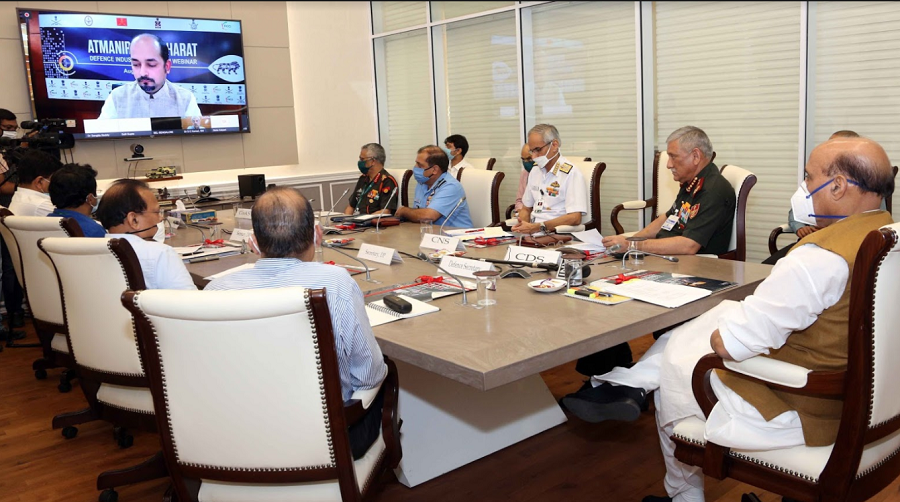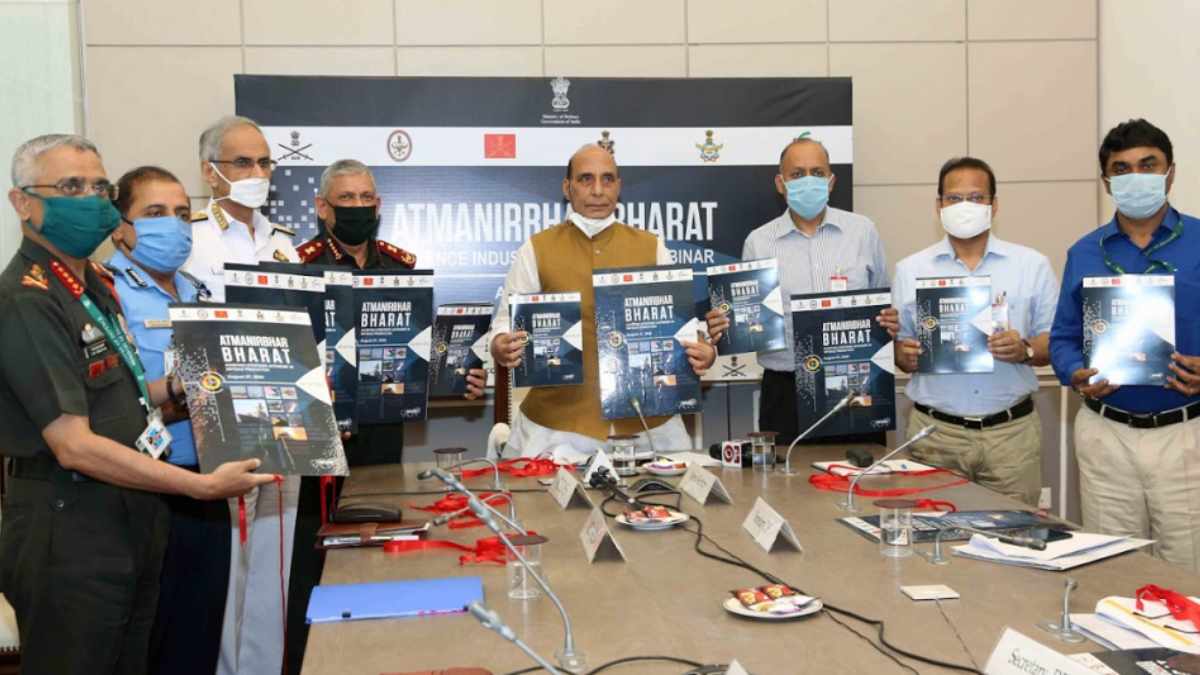Defence Minister Rajnath Singh listed out the salient features of the recently announced first defence production and export promotion policy at the Aatmanirbhar Bharat defence industry outreach webinar. The Webinar was jointly organised by the Society of Indian Defence Manufacturers (SIDM), Federation of Indian Chambers of Commerce and Industry (FICCI) and Department of Defence Production (DDP), Ministry of Defence (MoD).
Prime Minister Narendra Modi had highlighted the need for achieving selfsufficiency in defence production in his clarion call on ‘Aatmanirbhar Bharat Abhiyan’ during his announcement of Covid-related economic package of Rs 20 lakh crore on 12 May 2020. He further outlined his vision for the same on 2 June 2020, wherein five pillars of Aatmanirbhar Bharat were identified as economy, infrastructure, systems, vibrant demography and demand.
The defence sector has already been identified as one of the core areas to boost ‘Make in India’ where immediate transformation is required. PM Modi also spelt out his vision of achieving $5 billion (Rs 35,000 crore) defence related exports target to become net exporter of defence equipment in the next five years. Towards this end, a draft Production and Export Promotion policy has been formulated and it was placed in the public domain seeking suggestions from various stakeholders.

The draft of Production and Export Promotion policy aims at providing greater visibility of Armed Forces requirements to the defence manufacturing industry. The policy proposes establishment of an aeroengines complex with focus on Maintenance Repair Overhaul (MRO) as well as critical technologies. Under this policy export target has been set as 25 per cent of the revenue. By 2025, this policy aims at achieving Rs 1.75 lakh crore in annual turnover.
To promote Aatmanirbhar Bharat in the defence manufacturing, a separate budget of Rs 52,000 crore has been set aside for procurement from domestic vendors. Speaking on MoD recently issuing a negative list of 101 defence items on the valuable suggestion of Prime Minister Modi, Rajnath Singh said, “After a certain period of time these items will not be procured from outside. This list is the beginning of a process that has the potential to transform the defence industry. This list of 101 items includes not only minor parts but also warfare systems, integrated platforms, combat vehicles. This list is just a beginning, so that in the coming time, defence equipment worth Rs 1.40 lakh crore will be purchased domestically.”
The Defence Minister said that the government has made several bold policy reforms to promote self-reliance, in the defence sector. These include increasing the limit to 74 percent for Foreign Direct Investment through automatic route in the defence sector and setting up of defence corridors in UP and Tamil Nadu in addition to Strategic Partnership (SP) Model to promote investments, liberalisation of Industrial License regime, and ‘Defence Investor Cell’ to address the problems of investors.
Rajnath Singh said, “Selfreliance is actually another form of our confidence and strength. According to the formula presented by Prime Minister five ‘I’, i.e., Intent, Inclusion, Investment, Infrastructure and Innovation, we have taken steps towards increasing our own strength. Its results have also started coming in front of us.”
Speaking about the urge of Nations to become selfreliant, the Defence Minister said, “The spirit of selfreliance has always been present in our society, our education and values. It has existed as part of us, from our tradition to modern times. It has existed from ‘the Vedas’ to ‘Vivekananda Ji’, from ‘the Geeta’ to ‘Gandhi Ji’, and from ‘Upanishads’ to ‘Upadhyay’ (Deendayal) ji. Everyone, whether they have been our great men or our governments, in their own way accepted the importance of self-reliance. But in the recent past, the emphasis placed on the call of our Prime Minister Shri Narendra Modi on atmanirbharta is unprecedented.”
While answering questions from the participants, Rajnath Singh said that corporatisation of Ordnance Factory Board (OFB) would be completed within a year. In response to another question, Rajnath Singh replied that the two Defence Industrial Corridors in Uttar Pradesh and Tamil Nadu were targeted to attract thousands of crores of investments in the next five years.
Industry representatives also sought clarifications on various reforms introduced in defence acquisition procedure including offset provisions, reservation of items for procurement from MSMEs, definition of Indian vendor etc.
After the question and answer session, PM Modi addressed the webinar. The webinar was another step of outreach to Industry which aimed to evolve a mutually beneficial and pragmatic road map in consonance with industry expectations and capabilities.
The FICCI webinar which had representation from all three Services, MoD, DRDO and industry covered energising strategies to develop niche tech and promote culture of innovations. It was decided to develop large eco system with well-defined role for all stake holders/ MSMEs as tier-II / tier-III suppliers, start-ups and academia as innovators, industry houses as aggregators, testing & quality assurance services providers. To achieve the envisioned goal, Webinar encouraged innovation to make in India as an integral part of Global Supply Chain and top class destination for manufacture of defence equipment. It stressed to develop world class testing and evaluation infrastructure by utilising existing infrastructure with DRDO and private industry. The participants also discussed ways to develop manufacturing and sustenance eco system to help in life cycle support of indigenous equipment.
Chief of Defence Staff & Secretary Department of Military Affairs General Bipin Rawat, Chief of Army Staff General M.M. Naravane, Chief of Naval Staff Admiral Karambir Singh, Chief of Air Staff Air Chief Marshal R.K.S. Bhadauria, Principal Scientific Advisor to the Government of India Prof Vijaya Raghavan, Defence Secretary Dr Ajay Kumar, Secretary (Defence Production) Raj Kumar, Secretary Department of Defence R&D and Chairman DRDO Dr G. Satheesh Reddy, SIDM president Jayant D. Patil, FICCI president Sangeeta Reddy, former SIDM president Baba N. Kalyani, Chairman FICCI defence committee S.P. Shukla, senior civil and military officials of MoD, Ordnance Factory Board, DPSUs and private industry participated in the webinar which was watched by nearly 2,000 participants from industry and academia.

